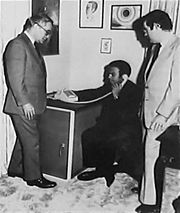
STU-I
Encyclopedia
The STU-I, like its successors sometimes known as a "stew phone", was a secure telephone
developed by the U.S. National Security Agency
for use by senior U.S. government officials in the 1970s.

Secure voice
Secure voice is a term in cryptography for the encryption of voice communication over a range of communication types such as radio, telephone or IP.-History:...
developed by the U.S. National Security Agency
National Security Agency
The National Security Agency/Central Security Service is a cryptologic intelligence agency of the United States Department of Defense responsible for the collection and analysis of foreign communications and foreign signals intelligence, as well as protecting U.S...
for use by senior U.S. government officials in the 1970s.

External links
See also
- KY-3KY-3The KY-3 is a secure telephone system developed by the U.S. National Security Agency in the early 1960s. The "TSEC" prefix to the model number indicates NSA's Telecommunications Security nomenclature system...
- Navajo INavajo IThe Navajo I is a secure telephone built into a briefcase that was developed by the U.S. National Security Agency. According to information on display in 2002 at the NSA's National Cryptologic Museum, 110 units were built in the 1980s for use by senior government officials when traveling...
- STU-IISTU-IIThe STU-II is a secure telephone developed by the U.S. National Security Agency. It permitted up to six users to have secure communications, on a time-shared basis. It was made by ITT Defense Communications, Nutley, New Jersey...
- STU-IIISTU-IIISTU-III is a family of secure telephones introduced in 1987 by the NSA for use by the United States government, its contractors, and its allies. STU-III desk units look much like typical office telephones, plug into a standard telephone wall jack and can make calls to any ordinary phone user...
- SCIP

